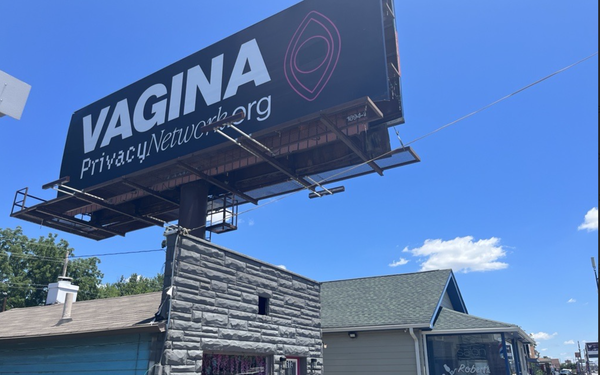
With billboards that
may shock Red State drivers and videos offering Big Brother-ish advice about burner phones and encrypted messaging, MSI Reproductive Choices is rolling out the Vagina Privacy Network, developed in
partnership with the Electronic Frontier Foundation.
The campaign is an education in privacy as much as an awareness campaign, aimed at protecting people's digital footprints. For those living
in areas with abortion restrictions, that can include criminal prosecution*, but everywhere, the risks include misinformation, being directed to anti-choice websites and fake pregnancy centers, and
tracking by abusive partners. Launched to coincide with the second anniversary of the U.S. Supreme Court’s Dobbs v. Jackson ruling, the international nonprofit hopes the effort will serve to
both gain attention for the privacy crisis abortion bans have created, and offer genuine service to those seeking access to medical care.
advertisement
advertisement
Whitney Chinogwenya, MSI’s global marketing
manager, tells Marketing Daily about the effort.
Marketing Daily: Can you give us a quick overview of what MSI is and why you are launching the Vagina Privacy Network here in
the U.S.?
Whitney Chinogwenya: MSI Reproductive Choices has a footprint in 36 countries, where we provide the full range of reproductive health services, including safe abortion
services and contraception. We don’t operate here in the U.S.
Marketing Daily: Then why launch this effort in America?
Chinogwenya: People often don't realize that
what happens in the U.S. affects what happens everywhere. I’m based in Johannesburg, and when we saw the overturning of Roe v. Wade in 2022, I initially didn't think it would affect my
day-to-day job in any way. But it did, because there was a rise in anti-choice activity globally, as anti-choice groups became bolder. What happens in the U.S. can even affect legislation in other
countries, so it is important that we start here.
Marketing Daily: You are announcing the Vagina Privacy Network with an out-of-home campaign, including billboards in Indiana, a
state with strict laws banning abortion. Vagina may not be a shock word, exactly, but you don’t see it in many ads. What’s the advantage of using such a blunt anatomical word?
Chinogwenya: Yes, we are starting there, but we will include other states and other countries, and we’re running on multiple digital platforms -- we want to raise awareness everywhere.
And we are using the word "vagina” in this way because we do need to get the attention of everybody we want to reach, but also because we shouldn't be afraid to say it. Women's rights are on the
ballot this year in 64 countries, and saying “vagina” is quite a central part of that. We are trying not to shy away from it.

Marketing Daily: Any negative reactions to the
billboards yet?
Chinogwenya: Not yet, but they only went up yesterday.
Marketing Daily: What’s the goal?
Chinogwenya: Awareness and education for
women on how to protect their privacy when they're online, searching for information they need. We know that many people rely on online search as a source for information on abortion and
contraception. We know they go online because they want this information to be confidential.
Marketing Daily: Many young people most in need of this kind of protection are digital
natives -- they are used to doing everything online. Most have never used an encrypted message or contemplated a burner phone. But in some cases, in Texas, text messages about abortion care have
already been used to prosecute women. Does this kind of warning shock them? How aware are they of digital risks? And are you sharing this with trans groups, since people seeking gender-affirming care
face similar risks?
Chinogwenya: Yes, we are working with all kinds of healthcare groups. We need to educate people. And it’s more than worrying about law enforcement. We now
see anti-choice crisis pregnancy centers putting up websites aimed at luring women seeking abortion services away from abortion providers.
Marketing Daily: The precautions you outline
in the video frightened me. Turn off your phone. Take public transit, not your car. Pay cash. How do people react?
Chinogwenya: I was also very frightened when I first realized the need
for this. That’s why we've been proud to partner on this initiative -- we need to raise awareness.
Marketing Daily: You created this network with the Electronic Frontier
Foundation. Why?
Chinogwenya: We’re not an electronic expert. We wanted to make sure everything we did was safe, that our guide was accurate, and that it would protect
[people].
Marketing Daily: You’re a marketing expert and aware that the marketing world thrives on people not worrying about privacy, whether learning what kind of shoes we
wear or what flavor of ice cream we like. Your report earlier this year, revealing how both Meta and Google restrict access to reproductive health information, showed how potentially damaging the
digital world can be. Yet our data is valuable. How has working on this changed your ideas about ad targeting?
Chinogwenya: I know why we marketers use this data. But there is a
difference between using it to market shoes and for the services that we provide. We understand the need for data, but also for women’s privacy.